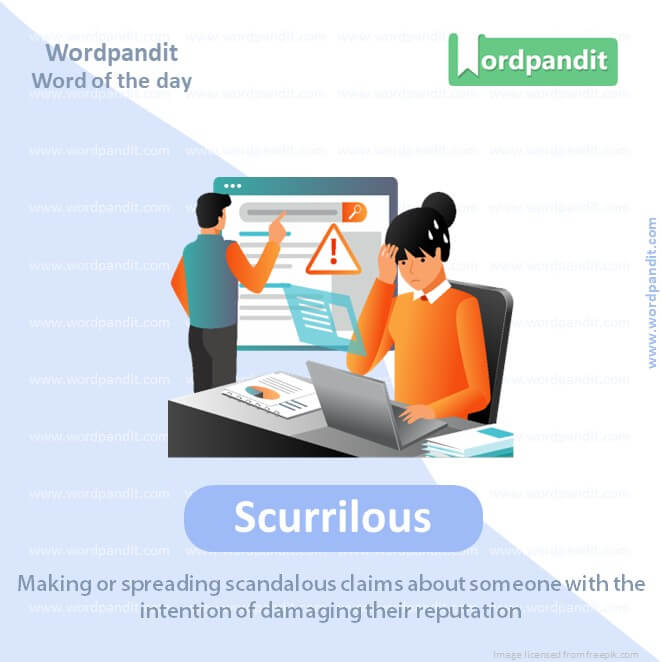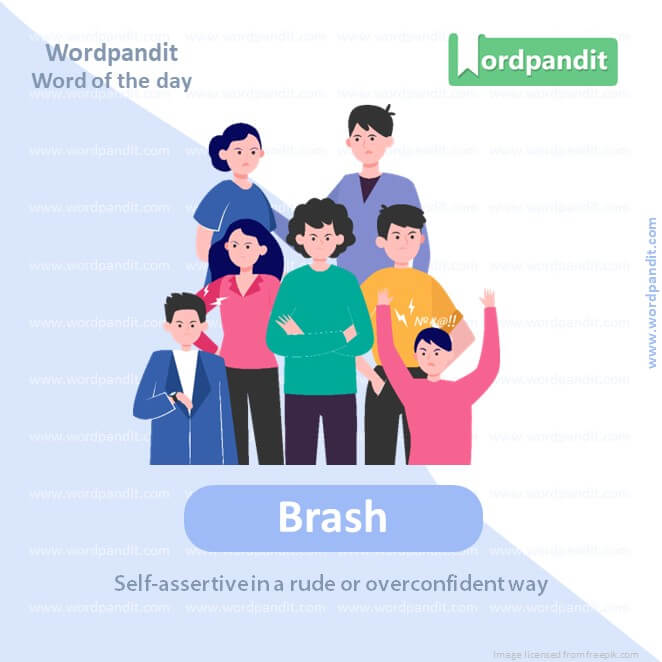Daily Vocabulary Words: List of Daily Used Words in Leading International Newspapers
Hi there. Welcome to this special section @ Wordpandit.
Our endeavour here is very simple: to highlight important daily vocabulary words, which you would come across in leading newspapers in the country. We have included the following newspapers in our selection:
• The New York Times
• The Washington Post
• Scientific American
• BBC
• The Guardian
• Psychology Today
• Wall Street Journal
• The Economist
We are putting in extensive work for developing your vocabulary. All you have got to do is be regular with this section and check out this post on a daily basis. This is your repository of words that are commonly used and essentially, we are posting a list of daily used words. Hence, this has significant practical application as it teaches you words that are used commonly in leading publications mentioned above.
Visit the website daily to learn words from leading international newspapers.

WORD-1: Supremacists
CONTEXT: “Rise in white supremacists’ activities has prompted lawmakers to reconsider current hate crime legislation.”
SOURCE: The New York Times
EXPLANATORY PARAGRAPH: Imagine some people believe they are better than others because of their skin color, race, or beliefs, and they think everyone else should agree with them. These people are called supremacists. It’s like when a kid thinks they’re the best at a game and wants everyone to know and accept it, even if it’s not true or kind.
MEANING: Individuals who believe that one group, often based on race, religion, or nationality, is superior to all others (noun)
PRONUNCIATION: soo-preh-muh-sists
SYNONYMS: bigots, racists, chauvinists, prejudiced, fanatics, extremists, zealots
USAGE EXAMPLES:
1. The march was organized by white supremacists.
2. Supremacists often spread hateful ideas.
3. Many communities stand up against supremacists.
4. Supremacists base their beliefs on misinformation.

WORD-2: Inferno
CONTEXT: “Last summer’s inferno in the Australian bush has ignited a debate about climate change policies.”
SOURCE: The Guardian
EXPLANATORY PARAGRAPH: Imagine a huge fire, much bigger than a campfire, burning really brightly and fiercely. This big, scary fire is called an inferno. It’s like when you see a superhero movie and there’s a big explosion with a lot of flames; that can look like an inferno.
MEANING: A large fire that is dangerously out of control; a place or situation resembling hell in its heat, noise, or destructiveness (noun).
PRONUNCIATION: in-fur-no
SYNONYMS: blaze, conflagration, firestorm, holocaust, flames, bonfire, wildfire
USAGE EXAMPLES:
1. The forest turned into an inferno in the summer heat.
2. Firefighters battled the inferno for hours.
3. The building was engulfed in an inferno.
4. Everyone evacuated the area due to the spreading inferno.

WORD-3: Allegiance
CONTEXT: “As tensions rise in the region, smaller nations are faced with the dilemma of where their allegiance lies.”
SOURCE: Al Jazeera
EXPLANATORY PARAGRAPH: Allegiance is like when you promise to be on someone’s team or side, no matter what. It’s like when you and your best friend have a secret handshake and promise to be buddies forever; that’s showing allegiance.
MEANING: Loyalty or commitment to a person, group, or cause (noun).
PRONUNCIATION: uh-lee-jens
SYNONYMS: loyalty, fidelity, faithfulness, devotion, commitment, support, dedication
USAGE EXAMPLES:
1. Her allegiance to the country was unwavering.
2. He swore allegiance to the king.
3. Their allegiance was to the rebel cause.
4. The team’s fans showed their allegiance by wearing the team’s colors.
WORD-4: Gullible
CONTEXT: “Online scams continue to proliferate, targeting the most gullible users with promises of quick riches.”
SOURCE: The Washington Post
EXPLANATORY PARAGRAPH: Imagine if someone told you that pigs can fly, and you believed them without questioning it. That means you’re gullible. It’s like when someone tells a silly story and you think it’s true because you trust them easily.
MEANING: Easily fooled or tricked. (adjective)
PRONUNCIATION: guh-lih-bul
SYNONYMS: naive, trusting, credulous, unsuspecting, easily deceived, impressionable, exploitable
USAGE EXAMPLES:
1. He’s so gullible that he believed the story about the moon being made of cheese.
2. She’s always playing pranks on her gullible brother.
3. It’s not good to be too gullible in this world.
4. The scammer targeted gullible individuals.

WORD-5: Scurrilous
CONTEXT: “Political campaigns often see their fair share of scurrilous rumors, but this year’s has been particularly rife with misinformation.”
SOURCE: The Economist
EXPLANATORY PARAGRAPH: Scurrilous is a word used to describe something mean or bad that someone says about another person, and it’s not true! It’s like if someone made up a naughty story about someone just to be mean.
MEANING: Making or spreading scandalous claims about someone with the intention of damaging their reputation (adjective)
PRONUNCIATION: skur-ih-lus
SYNONYMS: slanderous, defamatory, malicious, insulting, derogatory, libelous
USAGE EXAMPLES:
1. The newspaper was sued for its scurrilous accusations.
2. She made a scurrilous comment about her opponent.
3. The rumors were scurrilous and hurtful.
4. They spread scurrilous stories to damage his reputation.

WORD-6: BRASH
CONTEXT: The CEO’s brash approach to company expansion has both its critics and proponents.
SOURCE: BBC
EXPLANATORY PARAGRAPH: Brash is when someone or something is very bold, loud, and doesn’t think before acting or speaking. It’s like when someone shouts out an answer in class without raising their hand or waiting their turn.
MEANING: Self-assertive in a rude or overconfident way (adjective).
PRONUNCIATION: brash
SYNONYMS: bold, impudent, cheeky, brazen, audacious, rash, forward
USAGE EXAMPLE:
1. He made a brash decision without consulting anyone.
2. Her brash comments surprised everyone at the meeting.
3. The player’s brash attitude made him unpopular with the team.
4. It was a brash move to challenge the champion.
WORD-7: CHARLATANS
CONTEXT: In the age of the internet, it has become increasingly easy for charlatans to peddle fake remedies to unsuspecting individuals.
SOURCE: Scientific American
EXPLANATORY PARAGRAPH: Charlatans are people who pretend they can do something special or have some knowledge, but they really don’t. It’s like someone pretending they’re a doctor when they haven’t studied medicine, just to trick people.
MEANING: People who pretend to have special skills or knowledge to deceive others. (noun)
PRONUNCIATION: shar-luh-tans
SYNONYMS: frauds, impostors, fakes, swindlers, pretenders, deceivers, quacks
USAGE EXAMPLE:
1. He was exposed as a charlatan selling fake remedies.
2. The town was full of charlatans claiming to have special powers.
3. She warned her friend against the charlatan offering investment advice.
4. Charlatans often prey on the hopes and fears of people.
WORD-8: DANGLING
CONTEXT: With the deadline fast approaching, the fate of the trade deal is still dangling, leaving businesses in uncertainty.
SOURCE: The Guardian
EXPLANATORY PARAGRAPH: Imagine if you’re holding a toy by a string and it swings back and forth below your hand. That toy is dangling. It’s like when you sit on a ledge and let your legs hang down without touching the ground.
MEANING: Hanging or swinging loosely. (verb/adjective)
PRONUNCIATION: dang-gling
SYNONYMS: hanging, swinging, drooping, suspending, pendulous, draping, loosing
USAGE EXAMPLE:
1. She sat on the bridge with her feet dangling over the water.
2. The child held a yo-yo, dangling it back and forth.
3. There were Christmas lights dangling from the tree.
4. He noticed a spider dangling from its web above him.
WORD-9: BELEAGUERED
CONTEXT: The beleaguered prime minister is facing yet another scandal, putting additional strain on an already tense political climate.
SOURCE: The Economist
EXPLANATORY PARAGRAPH: Beleaguered is when someone or something is surrounded by problems or difficulties. It’s like if you were trying to build a sandcastle at the beach, but waves kept washing it away, and birds kept landing on it, and everything seemed to be against you – that’s being beleaguered.
MEANING: Surrounded by difficulties or under constant pressure. (adjective)
PRONUNCIATION: bih-lee-gurd
SYNONYMS: besieged, under siege, surrounded, beset, harried, strained
USAGE EXAMPLE:
1. The beleaguered city was running out of supplies.
2. The coach was beleaguered with questions about the team’s performance.
3. She felt beleaguered by the endless demands of her job.
4. The beleaguered ship struggled to reach the shore.
WORD-10: CANDOUR
CONTEXT: In his memoir, the actor speaks with unexpected candour about his challenges in Hollywood.
SOURCE: BBC
EXPLANATORY PARAGRAPH: Candour is when someone tells the truth or shares their feelings honestly, even if it might be a bit uncomfortable. It’s like if you ate the last cookie and instead of hiding it, you admit it openly to your family because you want to be truthful.
MEANING: The quality of being honest and straightforward in attitude and speech. (noun)
PRONUNCIATION: kan-dur
SYNONYMS: honesty, frankness, sincerity, straightforwardness, openness, genuineness
USAGE EXAMPLE:
1. She spoke with candour about her mistakes.
2. His candour was refreshing in the world of politics.
3. She appreciated the candour of his feedback.
4. With surprising candour, he revealed the company’s future plans.
vocabulary classes
In today’s multicultural world, knowledge is your greatest asset. And in this pool of knowledge, one arena that often goes underestimated is ‘vocabulary classes’. Most people limit the concept of vocabulary to knowing a few fancy words. However, it is much more; it’s about giving you the key to express your thoughts, feelings, and ideas more effectively.
Firstly, let’s examine why vocabulary classes are essential. When you take vocabulary classes, you’re essentially equipping your linguistic arsenal with words that allow you to articulate your messages more accurately. A well-developed vocabulary means not only knowing a multitude of words but also being able to utilize them in the appropriate context, thus enhancing your communication skills.
Now, how should we approach learning in vocabulary classes? The process of expanding your vocabulary should not be stressful. The best approach is to incorporate playfulness, curiosity, and active engagement. Incorporate reading, writing, listening, and speaking activities that are sourced from various contexts – books, movies, podcasts, discussions, and debates.
One important principle to remember when taking vocabulary classes is repetition. Repeated use of new words in different contexts will reinforce their meaning and solidify them in your memory, reducing the chance for forgetfulness.
Moreover, let’s not forget the role of technology in vocabulary classes. There’s a variety of applications and online platforms that have revolutionized the way we learn new words. They offer interactive classes, quizzes, games, and other engaging resources that make the learning process fun and effective.
In summary, vocabulary classes serve as a potent tool for enhancing your communication skills, and expressing your ideas confidently and clearly. Whether you are a business professional, student or just looking to improve your language abilities, vocabulary classes are amongst the best investments you could make. You not only learn new words but get the confidence and tools to wield them effectively.







